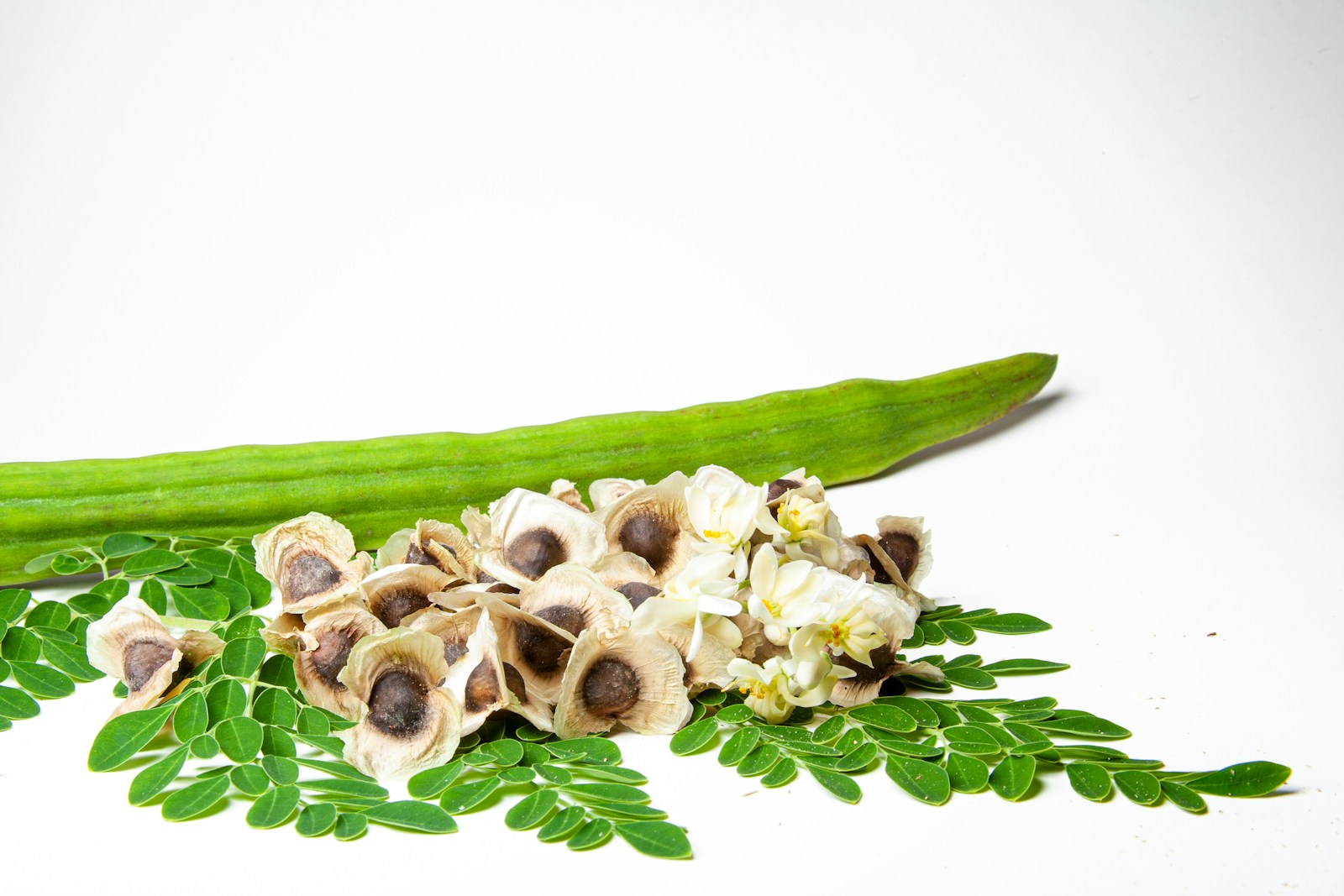![]()
Table of Contents
- Introduction
- Overview of Moringa Oleifera
- 2.1 Nutritional Profile
- 2.2 Common Names and Distribution
- Health Benefits of Drumsticks
- 3.1 Nutritional Benefits
- 3.2 Medicinal Properties
- 3.3 Antioxidant Effects
- 3.4 Blood Sugar Regulation
- 3.5 Anti-Inflammatory Properties
- 3.6 Fertility and Reproductive Health
- Culinary Uses of Drumsticks
- 4.1 Traditional Dishes
- 4.2 Innovative Recipes
- Potential Side Effects and Precautions
- Conclusion
- References
1. Introduction
Drumsticks, scientifically known as Moringa oleifera, have gained recognition as a superfood in recent years. Often referred to as the “miracle tree,” Moringa is celebrated for its impressive nutritional profile and numerous health benefits. This article explores the various aspects of drumsticks, including their nutritional content, health benefits, culinary uses, and potential side effects, providing a comprehensive guide for those looking to incorporate this remarkable plant into their diet.
2. Overview of Moringa Oleifera
2.1 Nutritional Profile
Moringa leaves, pods, and seeds are rich in essential nutrients. A 100-gram serving of fresh drumstick pods contains:
- Calories: 37
- Protein: 2.1 g
- Carbohydrates: 8.4 g
- Fiber: 3.2 g
- Fat: 0.2 g
- Vitamin C: 157% of the Daily Value (DV)
- Calcium: 18% of the DV
- Iron: 25% of the DV
- Potassium: 14% of the DV
The leaves are particularly nutrient-dense, providing significant amounts of vitamins A, C, and several B vitamins, as well as minerals such as calcium, potassium, and iron[1][2][4].
2.2 Common Names and Distribution
Moringa is known by various names around the world, including:
- Drumstick tree (English)
- Sahjan (Hindi)
- Murinna (Malayalam)
- Sigru (Punjabi)
- Horseradish tree (English)
Native to the Indian subcontinent, Moringa is now cultivated in many tropical and subtropical regions, including Africa, Southeast Asia, and South America[3][4].
3. Health Benefits of Drumsticks
3.1 Nutritional Benefits
The high nutritional value of drumsticks makes them an excellent addition to a balanced diet. They are particularly beneficial for vegetarians and those seeking to increase their protein intake without consuming animal products. The presence of essential vitamins and minerals supports overall health and helps prevent deficiencies[2][4].
3.2 Medicinal Properties
Moringa has been used in traditional medicine for centuries. Various parts of the plant, including leaves, pods, and seeds, exhibit medicinal properties that may help manage several health conditions:
- Diabetes Management: Research indicates that Moringa may help lower blood sugar levels. Studies have shown that extracts from Moringa leaves can reduce serum glucose levels and improve insulin sensitivity, making it beneficial for individuals with prediabetes and diabetes[1][3].
- Anti-Inflammatory Effects: Moringa contains compounds with anti-inflammatory properties, which may help alleviate symptoms of conditions like arthritis and joint pain. Regular consumption can support joint health and reduce inflammation in the body[2][4].
- Respiratory Health: The pods of Moringa have been found to aid in managing bronchial asthma and other respiratory issues. Certain compounds in Moringa exhibit bronchodilator effects, improving respiratory function[3][4].
3.3 Antioxidant Effects
Moringa is rich in antioxidants, which play a crucial role in protecting the body from oxidative stress. The antioxidants present in Moringa, such as quercetin, chlorogenic acid, and beta-carotene, help neutralize free radicals, reducing the risk of chronic diseases like heart disease and cancer[2][4].
3.4 Blood Sugar Regulation
The ability of Moringa to regulate blood sugar levels is particularly noteworthy. Studies have demonstrated that Moringa extracts can effectively lower blood glucose levels and improve lipid profiles in individuals with diabetes. This makes Moringa a valuable dietary addition for those looking to manage their blood sugar[1][3].
3.5 Anti-Inflammatory Properties
Moringa’s anti-inflammatory properties extend beyond joint health. The plant has been shown to reduce inflammation in various tissues, which can help prevent chronic diseases associated with inflammation, such as heart disease and certain cancers[2][4].
3.6 Fertility and Reproductive Health
Moringa is believed to have positive effects on fertility and reproductive health. The nutrients and bioactive compounds found in Moringa may support reproductive function in both men and women. Some studies suggest that Moringa can enhance sperm motility and count, making it a potential natural remedy for infertility[3][4].
4. Culinary Uses of Drumsticks
4.1 Traditional Dishes
Drumsticks are a staple in many traditional cuisines, particularly in South Asia. They are commonly used in curries, soups, and stews. In Indian cuisine, drumsticks are often added to sambar, a lentil-based vegetable stew, and are also used in various regional dishes.
4.2 Innovative Recipes
In addition to traditional uses, drumsticks can be incorporated into modern recipes. Here are a few ideas:
- Drumstick Stir-Fry: Sauté drumstick pods with garlic, onions, and your choice of vegetables for a quick and nutritious side dish.
- Moringa Smoothie: Blend fresh Moringa leaves with fruits like bananas and mangoes for a nutrient-packed smoothie.
- Drumstick Soup: Simmer drumstick pods with vegetable broth, spices, and other vegetables for a hearty soup.
- Moringa Pesto: Substitute basil with Moringa leaves in a pesto recipe for a unique twist on this classic sauce[2][4].
5. Potential Side Effects and Precautions
While drumsticks are generally safe for consumption, it’s essential to be aware of potential side effects and precautions:
- Digestive Issues: Excessive consumption of Moringa may lead to digestive discomfort, including diarrhea or an upset stomach. Moderation is key.
- Drug Interactions: Moringa may interact with certain medications, particularly those for diabetes and blood pressure. It’s crucial to consult with a healthcare professional before adding Moringa to your diet, especially if you are on medication[1][3].
- Pregnancy and Lactation: Pregnant and breastfeeding women should exercise caution when consuming Moringa, as some parts of the plant may have adverse effects. Consulting a healthcare provider is advisable[2][4].
6. Conclusion
Incorporating drumsticks, or Moringa oleifera, into your diet can provide numerous health benefits, thanks to its rich nutritional profile and medicinal properties. From managing blood sugar levels to supporting respiratory health, Moringa is a versatile and valuable addition to any diet. However, it’s essential to consume it in moderation and consult with a healthcare professional if you have any concerns or pre-existing conditions.
7. References
Citations:
[1] https://pharmeasy.in/blog/ayurveda-uses-benefits-side-effects-of-drumstick/
[2] https://www.netmeds.com/health-library/post/drumstick-health-benefits-nutrition-uses-recipes-and-side-effects
[3] https://www.truemeds.in/blog/drumsticks-health-benefits
[4] https://www.healthifyme.com/blog/drumsticks/
[5] https://pharmeasy.in/blog/ayurveda-benefits-uses-and-side-effects-of-drumstick-tree/

